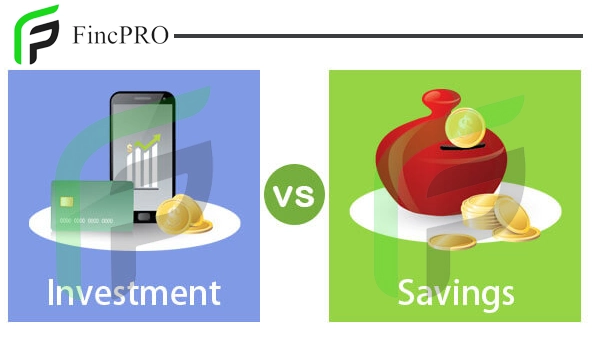People ask a common question: “which is better, saving or investing?”

This question can be challenging to answer because there are a lot of factors to consider. Let’s take a look at some of the main differences:
The main differences between Saving and Investing
What is Saving?
When people think about saving, they typically think of putting money away into a savings account or CD. This is a form of investing, as the money is being put into something that has the potential to grow over a more extended period. However, many people do not fully understand the difference between saving and investing, making it difficult to make informed financial decisions.
Saving is “the act or practice of preserving money or material possessions by setting aside money for future use.” Hence, saving is about having future wealth but not necessarily about future income. On the other hand, the definition of Investing is “a monetary asset that is acquired in the hope of making a profit.” This is more about your money working for you rather than you working for it.
Savings accounts and CDs are a type of investment because they have the potential to generate earnings. For example, a savings or CD account may pay interest that compounds over time. This compound interest can eventually result in a significant return on the invested amount. Many people choose to save their money in these types of accounts to ensure they have access to it in the future.
This can be useful for people preparing to purchase a car, buy a house or start a family and want to ensure that they have enough funds to cover these expenses. However, it is essential to remember that savings accounts and CDs are not usually very liquid investments. It can be difficult to withdraw money from them quickly if you need to access it in an emergency. For this reason, most people invest most of their savings in the stock market or mutual funds.
What is Investing?
Investing is putting your money into something that has the potential to grow over time. This could be in stocks, bonds, real estate, or other investments. Investments are generally considered higher risk than savings, which is why they are better suited for those with a longer time horizon for their financial goals.
The definition of Investing says that it is “a process of spending money to buy assets that generate income or appreciate.”. An investment is something that you expect to increase in value. A risk is the possibility that you will not get as much return as you would like – such as in the stock markets. Therefore Investments have higher risks but higher rewards.
The different types of Investing are:
Stocks & Bonds: Stocks are shares of ownership in a company. When the company grows, the value of your stock will also increase. Bonds are a type of loan that you lend to a company or government in exchange for interest payments. These are considered less risky than stocks because they usually don’t involve as much risk as you imagine.
Real Estate: When you invest your money in real estate, you buy a property with the intent of selling it at a higher price than you paid for it at some point in the future. You can buy things like rental properties and condos with this strategy. Real estate investments tend to be more stable because they have a low correlation with the stock market.
Mutual Funds: Mutual funds are pooled funds that a professional money manager manages. You can purchase mutual funds through an investment broker or purchase them directly from a mutual fund company. Mutual funds can also be a great way to diversify your investment portfolio because you can invest in many different companies through the fund.
Precious Metals: You can invest in precious metals like gold and silver by purchasing bullion coins or bars. You can also buy stock in companies that produce gold, silver, and other precious metals. Investing in precious metals is a somewhat risky strategy because the price of metals can fluctuate significantly over time.

Saving and Investing – the Pros and Cons
Investing in the stock market has the potential for greater returns than saving your money in a savings account. However, it is also riskier than saving money because you can’t control the risk of your investments. On the other hand, savings accounts are safer and more predictable than investing in the stock market because you have guaranteed access to your money anytime. Still, you earn very little interest on your savings account. So which type of investment is better? It depends on your situation and what you are trying to accomplish with your money. Here are some examples of the pros and cons of saving vs. investing:
1) You can put your money in a savings account and earn interest without paying any taxes on the money you make. The federal government does not tax the interest you earn on savings until it is withdrawn (for example, when you retire and withdraw money from your 401k).
2) Since you have easy access to your savings, you can use them for emergencies or if you need to make a big purchase, such as a car or home.
3) Because you don’t risk losing money when your savings are in a safety deposit box at a financial institution, you won’t feel as much stress as you might with an investment in the stock market.
4) If you start saving when you are young, your money will have more time to compound and grow, which means that you will have more to invest later in life. If you wait until later to start investing, you won’t have as much money to work with, and you will have to go through a lot more risk to earn the same amount of money that you would have made if you had started investing earlier in life.
5) If you invest in the stock market, you can earn high returns or even see your investments’ value increase significantly over time. However, there is also the risk of losing money if the value of your portfolio goes down or you have a down market year in which the value of your investments decreases.
6) In general, you cannot borrow against stocks, so if you lose your job or run into an emergency, you would have to sell off your supplies to get the cash you need to survive. This means you would need to sell your stocks at the worst time possible to have enough money to pay your bills. On the other hand, you can borrow money against your bank account, or savings account if you need cash in a hurry.




